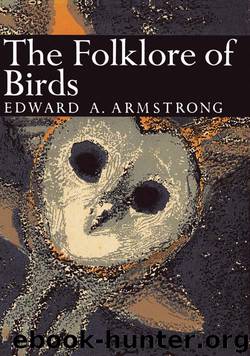The Folklore of Birds by Edward A. Armstrong

Author:Edward A. Armstrong
Language: eng
Format: epub, azw3
Publisher: HarperCollins Publishers
WALES
In a version from Carmarthenshire it is emphasized that the Hunt must be conducted in the old way rather than the new. The wren is to be killed with bow and arrow rather than with cannon and guns, to be cut up with hatchets and cleavers rather than with knives and forks, and to be boiled in cauldrons and pans rather than kettles and pots. The reference to firearms indicates that the song took its present form after their introduction, but the theme must be older and the emphasis on the use of ancient implements, as in France, illustrates the forces of conservatism at work to maintain traditions passed on from much earlier times. The mention of knives and forks in the Manx variant shows that this part of the song cannot be earlier than the eighteenth century, for these were not in general use until after 1726.
In Wales, the Wren Hunt was particularly associated with Twelfth Night, but the date of the celebration varied. Owen, writing at the end of last century, remarked that he had a dim recollection of participating in the Hunt on St. Stephen’s Day, but Peate states that it took place in readiness for the procession on Twelfth Day. Edward Lhuyd (ob. 1709), one of the earliest authorities, refers to the procession in Pembrokeshire on Twelfth Night, and as other writers endorse this, there can be no doubt of its accuracy. In the ‘sixties, however, the Wren Procession took place in Cardiff on St. Stephen’s Day, but this was due to Irish influence—an example of the reanimation and modification of a ceremony through influence from a related cultural stream separated from it long before. Sir W. Goscombe John wrote in 1929: “I remember as a child groups of young roughs—they were generally Irish, I think, going round the Canton district of Cardiff on Boxing Day with a holly-tree decked with ribbons and a dead wran with a bottle of spirits attached. The song they sang included the well-known lines, ‘St. Stephen’s Day was caught in the furze’.” Such an importation increases the probability that the Galloway observance was introduced from elsewhere. In Pembrokeshire, at Epiphany, a boy came round with coloured paper streamers in his hat and a wren in a cage. He sang:
Come and make your offering
To the smallest, yet the king,
Download
This site does not store any files on its server. We only index and link to content provided by other sites. Please contact the content providers to delete copyright contents if any and email us, we'll remove relevant links or contents immediately.
The Lonely City by Olivia Laing(4782)
Animal Frequency by Melissa Alvarez(4442)
All Creatures Great and Small by James Herriot(4293)
Walking by Henry David Thoreau(3937)
Exit West by Mohsin Hamid(3803)
Origin Story: A Big History of Everything by David Christian(3674)
COSMOS by Carl Sagan(3601)
How to Read Water: Clues and Patterns from Puddles to the Sea (Natural Navigation) by Tristan Gooley(3443)
Hedgerow by John Wright(3336)
How to Read Nature by Tristan Gooley(3311)
The Inner Life of Animals by Peter Wohlleben(3293)
How to Do Nothing by Jenny Odell(3284)
Project Animal Farm: An Accidental Journey into the Secret World of Farming and the Truth About Our Food by Sonia Faruqi(3205)
Origin Story by David Christian(3181)
Water by Ian Miller(3166)
A Forest Journey by John Perlin(3052)
The Plant Messiah by Carlos Magdalena(2910)
A Wilder Time by William E. Glassley(2841)
Forests: A Very Short Introduction by Jaboury Ghazoul(2822)
